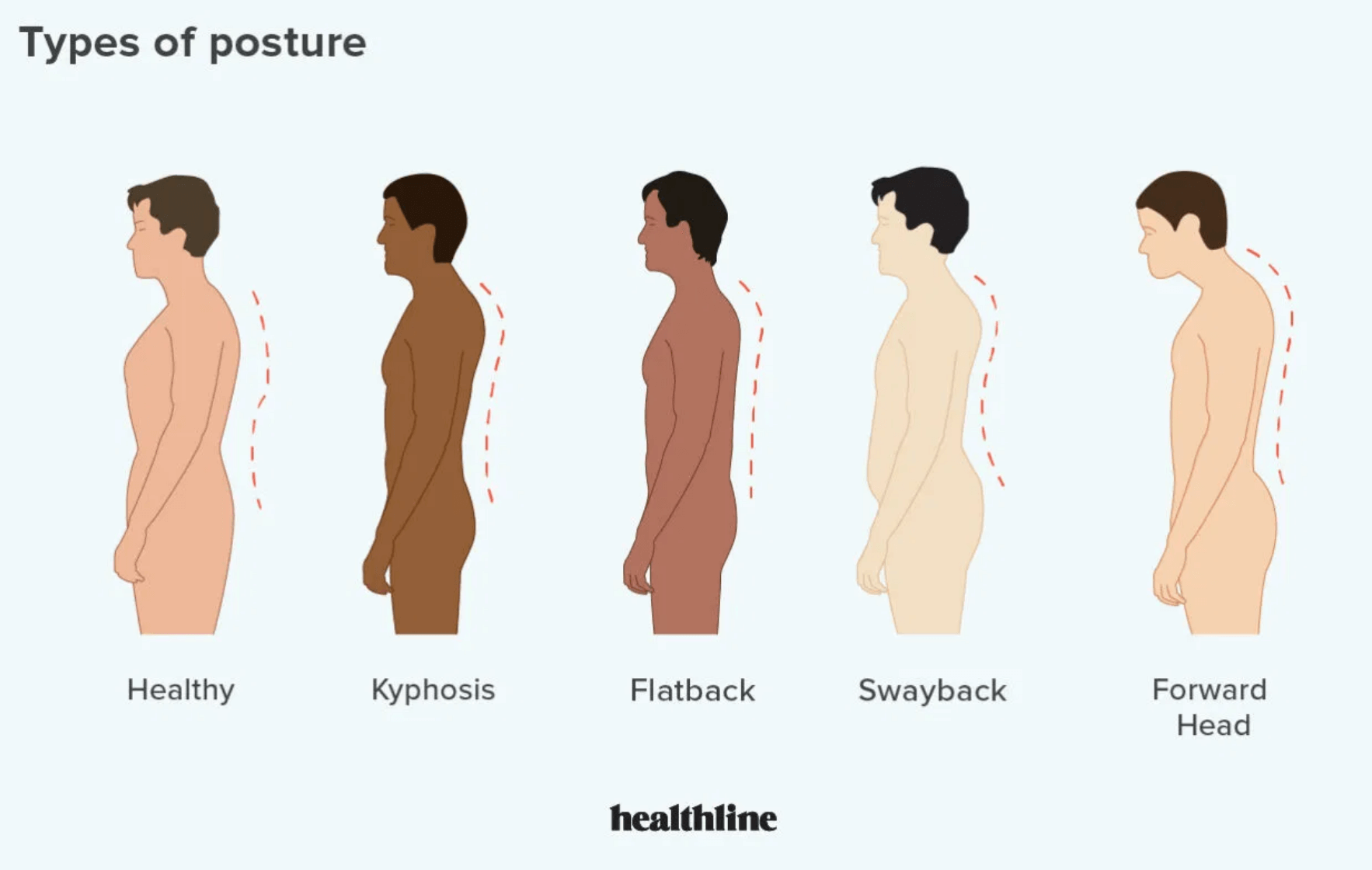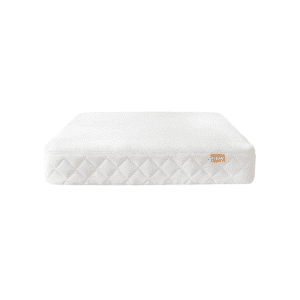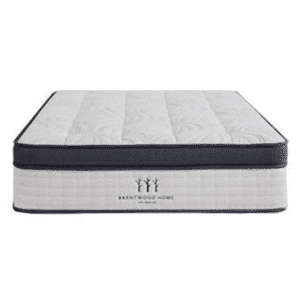Hunching over the computer for hours on end… Stiff neck… Sore back… Sound familiar? You can thank poor posture! Even if you’ve been hunching your shoulders for years, you have the power to change those habits. They’re not set in stone! Keeping proper posture is more than just “standing up straight.” But… why is it important to have good posture?
Keep reading to better understand the health implications of poor posture, the most common tendencies, tips, and what you can to do better control your posture.
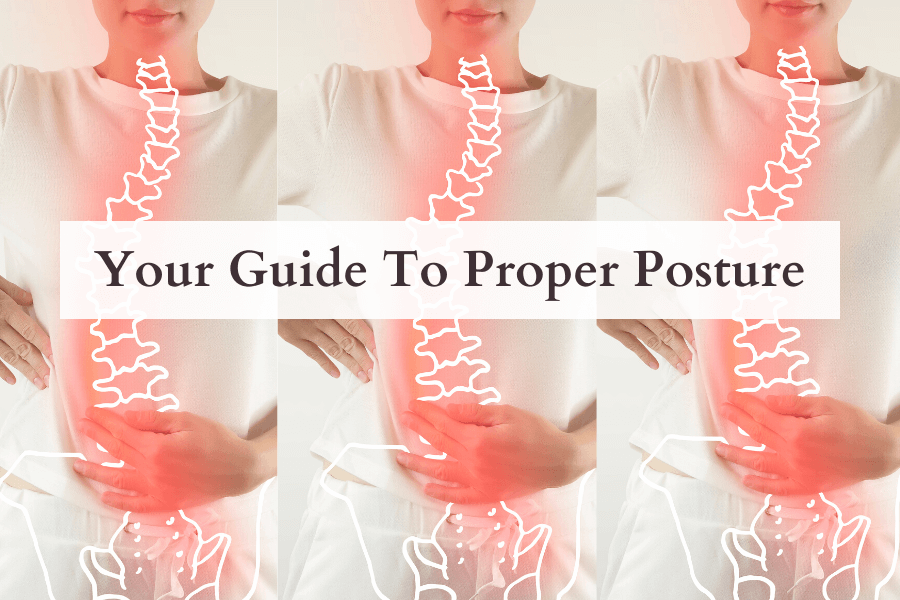
(Note: This article contains affiliate links, meaning In On Around will make a small commission at no additional cost to you. This helps me maintain the site. As always, I value full transparency & only work with brands I love and trust.)
What Is Posture?
Posture is our body’s position while we’re sitting, standing, and laying down. You don’t want there to be too much pressure or strain on any specific part of your body, like joints or ligaments.
We have both a dynamic and a static posture.
- Dynamic refers to our stance while we’re moving (when we’re running, walking, exercising etc…)
- Static posture, on the other hand, refers to our stance when we are not moving (such as sitting, sleeping, standing)
It’s essential that we have both proper dynamic and static posture! If one is out of balance, it can impact your whole body.
What Causes Poor Posture?
Working a desk job? Usually, we can start to feel the effects of poor postures after sitting for hours on end hunching over a screen. The neck and back are usually the first to be impacted.
The positioning of the spine is key. Using the computer, looking down while scrolling endlessly on the phone, and manual labor all contribute to poor positioning. Our modern-day habits are impacting our necks and backs way too much! Stress, pregnancy, obesity, tight muscles… and yes, even high heels can impact your posture as well!
Bad posture is usually attributed to weak back and abdominal muscles. Consistent inactivity ➜ Weakening muscles ➜ Decreased ability to keep your body upright
The Four Most Common Postural Tendencies
- Kyphosis – shoulders are rounded forward (similar to a hunchback)
- Flatback – lower back straightens out and the body inclines slightly forward
- Swayback (Lordosis) – pelvis tilts forward causing an exaggerated lower back curve (this can happen if you sit a lot)
- Forward head – head is tilted forward. To avoid this, your ears should be aligned with your body’s midline. Be aware of this if you’re a big texter/phone user (you don’t want text neck)!
How Can Poor Postures Impact Your Health?
Poor posture can…
- Lead to shoulder, neck, and back pain
- Misalign your body’s musculoskeletal system
- Make your spine & ligaments more prone to injury
- Increase your risk of arthritis & joint pain (due to wear and tear)
- Decrease your level of flexibility
- Affect your ability to properly balance
- Contribute to tension headaches
- Increase fatigue
- Decrease lung capacity
- Impact circulation
- Hurt form during a workout
- Make you seem shorter
… Yikes – these don’t sound fun!
Poor posture can lead to many health ailments.
How Do You Fix Your Posture?
Here Are Some Best Practice Tips:
The good news: unless you have a chronic condition, such as severe scoliosis, you have the power to improve your posture!
- Keep your ears in line with your midline (the imaginary line running down the center of your body)
- Keep your shoulders back and your head level
- Your feet should be shoulder-width apart
- Get up and walk around every 30 minutes, even if it’s for a minute! Get the blood flowing & stretch – it can do wonders for your body.
- If you regularly catch yourself with poor posture, set reminders on your phone every hour to remind yourself! This can help to train yourself over time. Continually check-in with how you’re sitting and standing.
- Use a more supportive chair, a standing desk, or a lumbar-supporting pillow
- Exercise, exercise, exercise, and incorporate proper weight training to build strength. It’s essential that you strengthen the upper back, chest, and core. Working with a Certified Personal Trainer can help!
- Take a look at your posture in the mirror. This can help you notice how your body changes when you’re slouching.
- Use supportive footwear, especially when exercising, standing for long periods, or lifting heavy objects. Although they’re pretty, consistently wearing high heels will make the problem worse.
- Be aware of how you’re sitting, especially when driving.
- Change the way you look at your phone by keeping it level with your head
- Discuss your posture with your doctor if you’re having any serious pain or any concern
What’s The Best Posture While Sleeping?
- Sleep on a comfortable, non-toxic mattress. Sleeping on a saggy mattress, or one that is too soft can do serious damage to your back. You can learn more about my favorite brands: here.
- Make sure your head is level with your spine (so avoid the super fluffy pillows)
- If you sleep on your side, keep your knees slightly bent to help maintain the curve in your back
Check Out The In On Around Shop
Spine-Friendly Exercises To Improve Posture
There are many posture-friendly yoga and fitness poses that can potentially help!
- Child’s pose
- Cat cow
- Cobra
- Forward fold
- Bridge pose
- Supine spinal twist
- Triangle pose
- High plank
- Downward-facing dog
- Use a foam roller on hip flexors and shoulders
Do Posture Correctors Work?
The short answer: no, posture correctors can oftentimes do more harm than good. The more you wear a posture corrector, the more dependent your body will become. While they can provide some temporary assistance, posture correctors can only be worn for a few hours at a time and they’re uncomfortable. Relying too much on a brace will only make matters worse in the long run.
Posture correctors can make the problem worse long-term.
Save this photo on Pinterest for future reference!
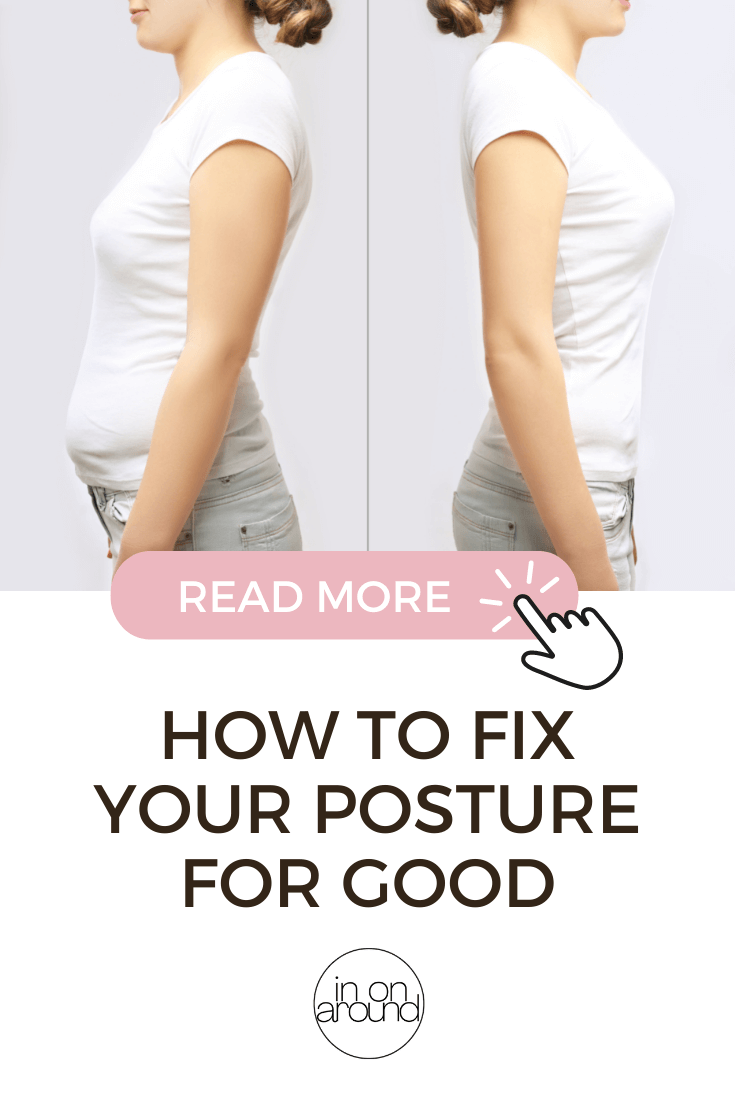
Frequently Asked Questions
Click on the below FAQs to learn more about “Why Is It Important To Have Good Posture?”
What is posture?
What causes bad posture?
How to fix my posture?
How does posture impact your health?
Do posture correctors work?

No, posture correctors do not work. The more you wear a posture corrector, the more dependent your body will become. While it can provide some temporary assistance, posture correctors can only be worn for a few hours at a time and they’re uncomfortable. Relying too much on a brace will only make matters worse in the long run.
How do I improve my posture?
What’s your favorite tip?
Just remember, the more your practice proper posture & strengthen your muscles, the easier it will be! Improving can take time, but consistency is key. You will thank yourself in the end!
Let me know! You can watch our web story here.
xoxo,

Want to read more? Check out my other articles here!
Information from Medline, Cleveland Clinic, Harvard, Healthline, Spine-Health, Verywell Fit
Copyright In On Around LLC 2021 © The statements made on this website have not been evaluated by the FDA (U.S. Food & Drug Administration). They are not intended to diagnose, treat, cure, or prevent any disease. The information provided by this website should not be used as individual medical advice and you should always consult your doctor for individual recommendations and treatment.

